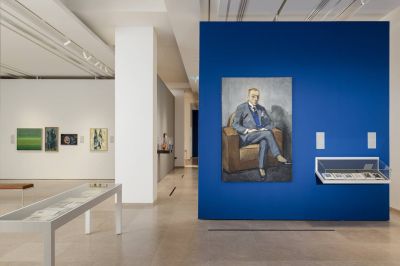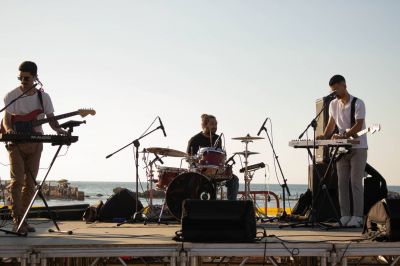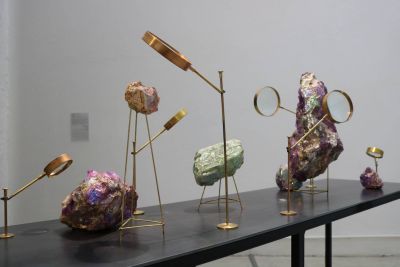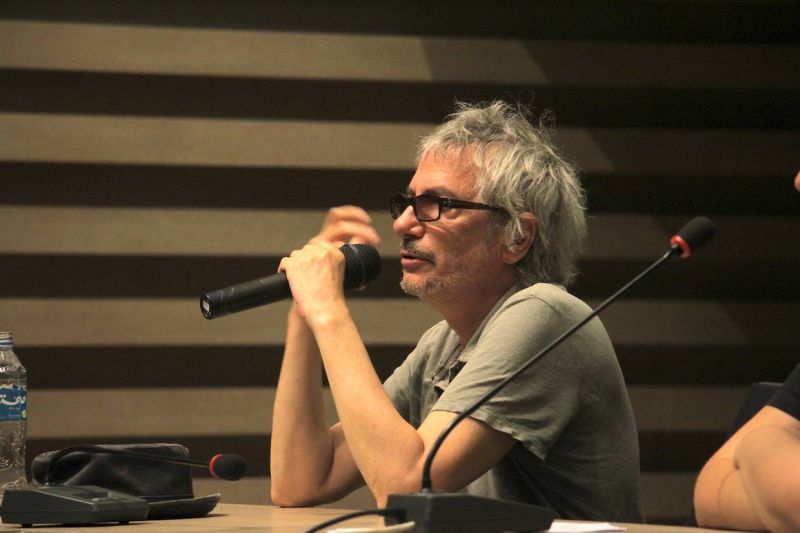
Leos Carax during “Conversation with Leos Carax,” at the Sursock Museum auditorium, June 17. (Credit: Celine Lahoud, courtesy of Maskoon)
BEIRUT — “I’m not aware of the unconscious mind, if I can be honest,” the anonymous female voice will say. “My starting point is the doubt, the uncertainties.”
Behind his spectacles, the man on stage will pause and blink. The auditorium hushed, he will open his mouth again, as if to speak.
“Is this interesting.” the woman will say. “Perhaps not. Is this captivating? Perhaps not.”
The man will shrug slightly, as if unable to add anything further, then lean back in his seat.
The simultaneous translation accompanying Saturday morning’s French-language “Conversation with Leos Carax” will begin with a crackle and a hiss. A few words later, the anonymous female voice will halt with a metallic clunk — not unlike the thunk a weighty ball bearing might make after falling from a piece of heavy machinery. A handful of people in the auditorium will be seen frowning at the black boxes wired to their headsets. Some will jab a finger at it. Others will look around the room, some faces plaintive, others annoyed.
Carax is celebrated in cinema circles as a filmmaker with a daring imagination, at once fearless and, based on some of his production travails, somewhat obsessive. Evidently, he is also inquisitive, as witnessed by his recent foray to Lebanon, where he was present for the projection of a couple of his early films, arranged by the Maskoon Fantastic Film Festival, and agreed to have this public conversation with producer and festival director Myriam Sassine.
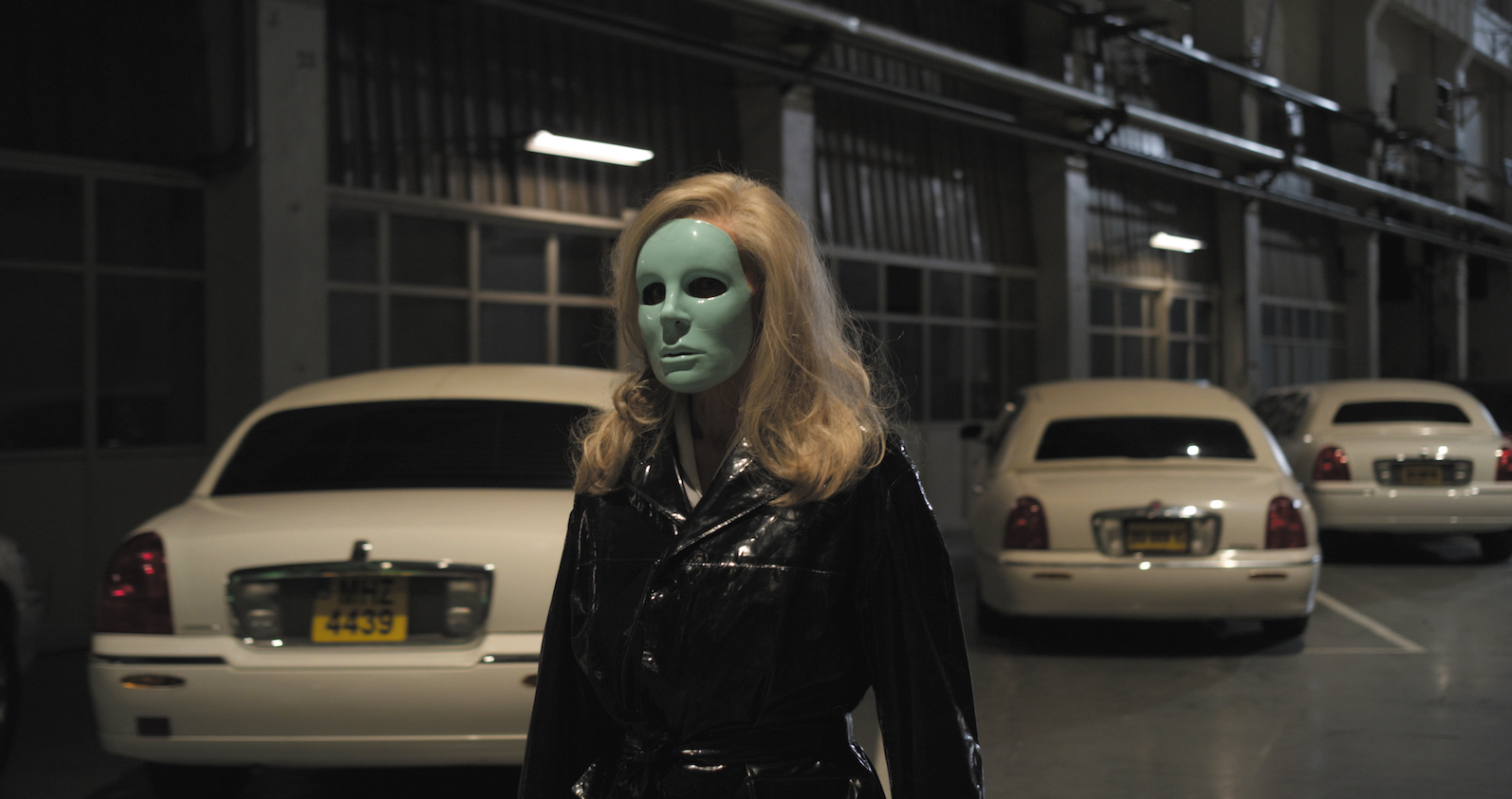 Holy Motors: Edith Scob in a still from Leos Carax’s 2012 feature “Holy Motors,” projected at IF June 16. (Credit: Courtesy Maskoon)
Holy Motors: Edith Scob in a still from Leos Carax’s 2012 feature “Holy Motors,” projected at IF June 16. (Credit: Courtesy Maskoon)
“Is Carax available,” L’Orient Today had asked Sassine some days before, “for interviews?”
“He’s not,” Sassine had replied. “But his manager told me he might be up for talking to journalists in an informal way. This is why we have cocktails before the screenings.”
So it is that, on the Friday evening before the filmmaker’s francophone exchange with the producer, L’Orient Today has reported to the gracious grounds of Beirut’s Institut français for an outdoor projection of Carax’s 2012 feature Holy Motors.
The film recounts a day in the life of Monsieur Oscar (Denis Lavant). As the film opens upon a large modernist country house, the camera accompanies the late middle-aged Oscar as he and his retinue walk past dozens of what appear to be security guards. In the distance, laughing children can be heard shouting goodbye and encouraging Oscar to “work hard” today. He arrives at a white, laughably long stretch limo, where Céline, his assistant and driver, greets him crisply before they depart with a couple of security men in tow.
Over just under two hours, the camera follows Oscar through the nine appointments that crowd his relentless day. Before each meeting, he assesses a file Céline’s provided, then dons the elaborate makeup, wigs and costumes of the radically diverse characters he must play for each of his encounters. The stories Oscar’s characters inhabit are widely varied — ranging from bleak realism to violent noir, melodrama, musical, the absurd and a memorable episode of motion-capture pantomime-cum-animation — sometimes comic, incessantly odd, always surprising. Holy Motors is a masterful contemplation of cinema, professional performance generally and, indeed, individual identity.
Back in the auditorium, the simultaneous translation will have crackled back to life for a moment, and an audience member will pose a question about a character dubbed Monsieur Merde, Carax’s recurring embodiment of violent, disruptive anarchy, who makes an obnoxious, full-frontal appearance in Holy Motors.
“I want you to forget that you are the film’s director,” the translator will say with an audible smile. “Just put yourself in my place, someone who is watching for the first time, and tell me, what is this movie about?”
Carax will lean forward, his hands framing his face, saying nothing.
“This is a nightmare for me,” the woman will translate when he does speak. “To recreate a response, this is also a nightmare, so it is two nightmares in one.”
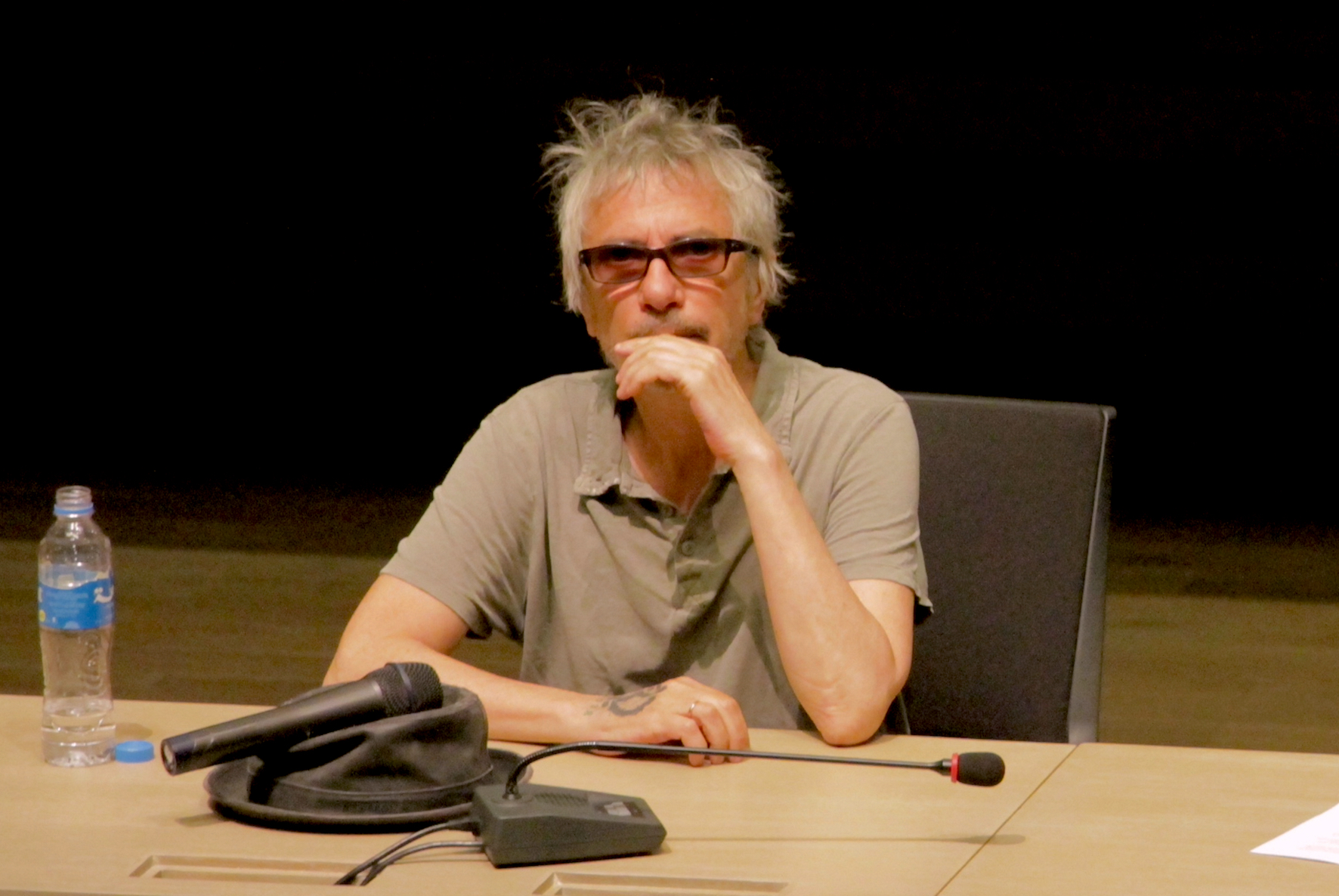 French auteur Leos Carax taking a question from the audience during “Conversation with Leos Carax,” at the Sursock Museum auditorium, June 17. (Credit: Celine Lahoud, courtesy of Maskoon)
French auteur Leos Carax taking a question from the audience during “Conversation with Leos Carax,” at the Sursock Museum auditorium, June 17. (Credit: Celine Lahoud, courtesy of Maskoon)
He will pause as a smattering of chuckles rises from the auditorium.
“I do not know how to say what a movie is about,” the translator will echo. “This is not my talent.”
The writer-director of Holy Motors is not the tallest man in the IF garden this evening. It can be surprising to meet filmmakers for the first time — particularly those who appear in their own films, as Carax has done. Drink in hand, he is chatting with some of the Maskoon-affiliated event organizers and periodically takes a drag from a hand-rolled smoke, a vintage mode of nicotine ingestion shared by many members of this planet’s creative community.
“I speak no Arabic,” Carax tells L’Orient Today shortly after the introductions.
“This is not uncommon in Beirut,” L’Orient Today replies.
The interlocutors blink at one another.
“Have you had a chance to see much of Lebanon?” L’Orient Today asks.
The director’s expression shifts to approximate an Excuse me?
“Have they taken you anyplace interesting?”
“I quite like to walk,” Carax blinks, sucking on his depleted dart, “but people keep telling me they will drive me.”
“There’s walking to be done here,” L’Orient Today says. “You might have them drive you to the seaside corniche — ”
“We took him to the Corniche,” interjects a smiling organizer.
“The seaside?” Carax blinked. “Yes we drove past it, I think.”
“You’d find a fair slice of Beirut walking there,” you blink back.
He nods discreetly. “Well anyplace can be representative of something, no?”
In the auditorium, meanwhile, a well-known Lebanese filmmaker will ask a double-barrelled question about the appearance of a family of chimpanzees at the end of Holy Motors and Carax’s feelings about how digital image-making has displaced celluloid in film production.
“I love monkeys,” the translator will reply in your headset. “In France, we’re not allowed to own monkeys as pets. I’ve always seen myself as one.”
He will pause as if to consider the second barrel of the question.
“I don’t want to feel nostalgic about film,” the female voice will resume. “I don’t think I’ll use it again. I noticed while shooting [his contribution to the 2008 omnibus feature] Tokyo! that video is much cheaper. I tend to shoot scenes multiple times.”
“Most of what I was doing [as a younger filmmaker] was building on a bluff, taking advantage of my youth,” she will say in response to another question. “I don’t think I am part of a movement. I haven’t met many filmmakers in my life.”
Several film students in the garden of IF have spotted Carax and approach to pay their respects, and homage.
“I am interested in seeing Baalbeck,” Carax tells L’Orient Today, “but it seems — ”
He notices the young faces smiling at him, then, and acknowledges them with a smile of his own.
L’Orient Today takes advantage of this pause in the informal interview to freshen its glass of wine. Running into a young director there, the journalist quizzes her about her new project. By this point, Carax and the film students appear to have exhausted their pleasantries. The students have dispersed to find a place to sit in front of the screen. Sitting on the grass now, Carax has removed his shoes and socks and rolled a fresh cigarette.
His attention seems fully engaged by a young woman, perhaps also unshod, who is in the late stages of assembling her own film project. In a few minutes, an organizer will introduce Holy Motors. The wine bar will dismantle itself and with it the pretense of an informal chat with the director.
The next morning Carax will retain his attitude of taciturn good humor throughout the “Conversation with Leos Carax.” At times Sassine, the producer, will deploy more words in her questions than Carax, the director, will marshall for his replies.
Carax is vastly more expansive and expressive in making his films than he is in discussing them. As one Lebanese filmmaker confided after Saturday’s conversation, this is an admirable trait.
